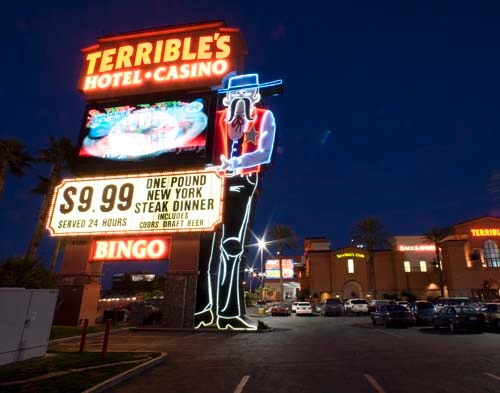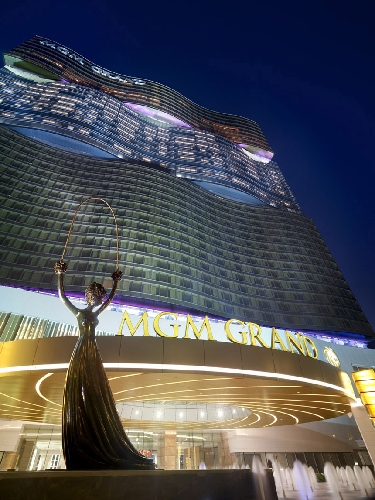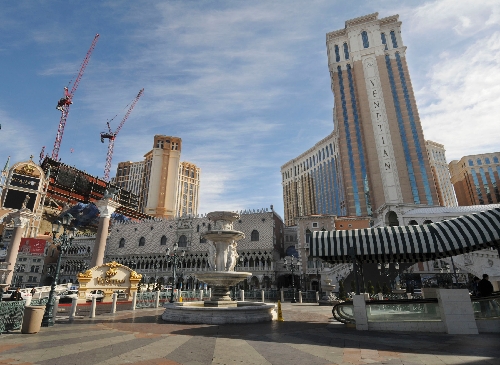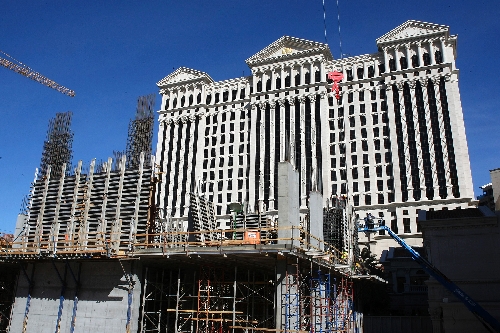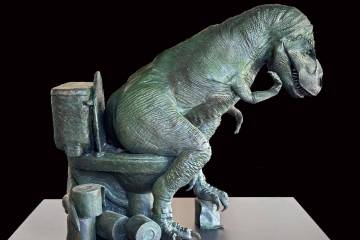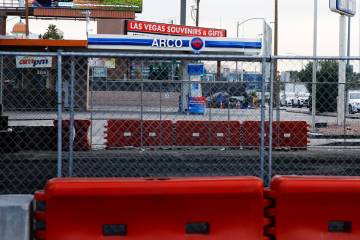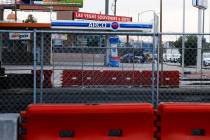Array of economic variables paints uncertain picture of gaming’s health
With the bankruptcy reorganizations of Station Casinos and Herbst Gaming winding down, analysts and industry observers have turned their focus toward other casino operators.
Speculation abounds on whether companies will follow Station and Herbst into filing bankruptcy court-administered plans of reorganization to wipe cumbersome debt loads off the books and create more manageable businesses.
Others believe corporate gaming executives have done enough to restructure long-term debt. Some of the largest casino operators negotiated maturity-date extensions of their obligations through a combination of adding new debt, increasing interest rates, or taking on new partners and investors.
Smaller, independent casinos have debt-management issues, too. The operators of the Riviera filed Chapter 11 bankruptcy in July. M Resort's primary lender held a private auction to sell $700 million of the property's debt.
"Most of the large-cap operators bought themselves some time," Wells Fargo Securities gaming analyst Dennis Farrell Jr. said. "With the one-off properties, we're seeing a lot of debt trading hands with people building positions in order to take control."
Farrell said that unless there is another serious dip in the economy, the major casino operators did their best to avoid bankruptcy.
"Most of these companies have cut costs as far as they can," Farrell said. "There is not much else you can cut without sacrificing service. If they haven't already filed (bankruptcy), I think the time has passed."
The next steps for most debt-loaded casino operators will be dictated by the performance of various gaming jurisdictions through the end of the year.
The Strip's results will heavily influence MGM Resorts International (10 Strip hotel-casinos including CityCenter's Aria) and Harrah's Entertainment (nine Strip hotel-casinos including the Rio).
Companies heavily concentrated in Atlantic City (Harrah's with four of the seaside community's 11 casinos) will be hard-pressed to succeed. The market has suffered through 23 straight months of declining gaming revenues without any prospects of a rebound on the horizon.
"Trends and spending levels on the Las Vegas Strip can still be characterized as getting less bad," JP Morgan gaming analyst Joe Greff told investors in a recent report looking at gaming results from the first six months of the year.
Gaming revenues on the Strip are up 2.6 percent through June. Greff wrote that convention bookings seem to be trending upward, as well.
"The next relevant data points will be in September, with group business returning and likely having a positive impact on room mix," he said.
As for regional markets, Pennsylvania and Colorado are showing signs of growth, mainly due to regulatory changes. Colorado increased wagering limits and allowed casinos to remain open for 24 hours while Pennsylvania allowed its slot machine-only casinos to add table games.
Meanwhile, Macau continues to boom with gaming revenues through July up some 70 percent over 2009. Those numbers help Macau market leaders Las Vegas Sands Corp. and Wynn Resorts Ltd. weather declining Las Vegas figures.
Las Vegas Sands is also picking up financial returns from its $5.7 billion investment in the Marina Bay Sands, the company's Singapore resort that opened in April.
"Initial gaming revenue results out of Singapore are very encouraging and suggest a very deep market that should generate very high cash flow margins, reflective of an attractive duopolistic market located in a financial hub in Asia with a relatively low gaming tax rate," Greff said.
For many casino operators, survival depends upon a host of variables.
STATION CASINOS
A federal bankruptcy judge confirmed the company's two-pronged reorganization plan on Aug. 27. After Nevada gaming regulators and the National Indian Gaming Commission rule on the new corporate ownership structure, Station Casinos is expected to emerge intact in early 2011.
The reorganization reduced by $4 billion the $6 billion debt that sent Station Casinos into Chapter 11 in July 2009.
Fertitta Gaming, which was formed by Station Casinos founders Frank Fertitta III and his brother Lorenzo, will operate the reorganized company. The Station name will remain in place.
The brothers put up $85 million for a 46 percent ownership stake in a new holding company owned by real estate investor Colony Capital and lenders Deutsche Bank and JP Morgan. The new company will take over Red Rock Resort, Palace Station, Sunset Station, Boulder Station, and the Wild Wild West and its adjoining 110 acres.
Fertitta Gaming also put in $74 million of a successful $772 million bankruptcy-supervised auction bid to acquire 11 of Station Casinos' properties, land holdings and American Indian gaming contracts.
Still to be determined is the future of Green Valley Ranch Resort and Aliante Station, which were not part of the bankruptcy. Station Casinos operates the casinos in a 50-50 joint venture with the Greenspun family and the owners are working to restructure the properties' debt.
HERBST GAMING
The reorganization of Herbst Gaming had a very different ending.
The Herbst brothers, Ed, Tim and Troy, who founded and built the casino and slot-route operation, lost all ownership and control of the company in the bankruptcy plan that was approved by a judge in January.
The Herbsts first proposed a reorganization plan that would have left them with controlling interest in the company's 600-location, 6,800-machine Nevada slot route, giving the casinos to its primary lenders.
In the end, after noteholders balked at the original plan, the lenders took everything.
With the plan confirmed, reorganized Herbst Gaming is awaiting approval of the new ownership structure from gaming authorities in Nevada, Iowa and Missouri.
"It's kind of like being in escrow," Herbst Gaming President Ferenc Szony said. "The old group is running the business until the new business is licensed."
Szony said the company should emerge from bankruptcy by the end of the year.
Along with the slot-route operation, Herbst has 12 casinos in Nevada, a casino in Iowa and two casinos in Missouri. The bankruptcy reorganization wiped $1.1 billion in debt off the books but left a consortium of lenders, including a Connecticut-based hedge fund, owning the business.
A new board of directors will govern the company, which operates the off-Strip Terrible's and three Primm Resorts.
"It's a matter of getting everybody comfortable and coming out on the other side," said Szony, who will manage the new operation with former Coast Casinos executive David Ross.
MGM RESORTS INTERNATIONAL
The company carries some $13 billion in debt but took steps in the past year to address its balance sheet and liquidity. MGM Resorts amended and extended the maturity dates of its debt, accessed the secured bond market and issued $1.15 billion in convertible notes in April.
"These transactions have provided over $2 billion of available liquidity," MGM Resorts Chief Financial Officer Dan D'Arrigo said.
MGM Resorts has a 50 percent ownership in the MGM Grand Macau and the company hopes to raise about $500 million later this year when it launches an initial public offering on the Hong Kong Stock Exchange. Some of the proceeds might go toward building a second Macau casino on land the company and its joint venture partner have secured on the Cotai Strip.
"Their biggest goal is to have more exposure in Macau," Farrell said.
MGM's other plans for raising cash include the sale of its 50 percent ownership in Atlantic City's Borgata and other land holdings. Last month, the company sold the land underneath the Borgata for $73 million.
LAS VEGAS SANDS CORP.
Since November 2008, Las Vegas Sands has taken steps to keep the company out of bankruptcy court. The casino operator shut down its Cotai Strip construction projects and condominium tower on the Strip when the credit markets dried up.
A move in late August to pay off more than $1 billion in outstanding debt and extend the maturity of about 75 percent of its loans by another three years was the final stage in the process. The company completed a $2.1 billion equity deal in November 2008 and public offering last fall on the Hong Kong Stock Exchange that raised $2.5 billion.
Las Vegas Sands has $3.9 billion in long-term debt, three-quarters of which is due in 2015 and 2016. Now, it has the financial breathing room to restart stalled casino projects in Macau and explore other gaming opportunities.
"Not only does the latest transaction reaffirm management's commitment towards de-levering, but it also provides the company with ample flexibility to endure reduced business volumes in Las Vegas and focus on ramping up existing operations," Deutsche Bank gaming analyst Andrew Zarnett said.
HARRAH'S ENTERTAINMENT
A regulatory filing in early August to publicly list a billionaire investor's 9.9 percent stake in the company could sample the waters for the privately held operator's own initial public offering.
KDP Investment Advisors bond analyst Barbara Cappaert said Harrah's might be exploring an IPO to raise cash some two years after it was taken private in a $29 billion private equity buyout.
Harrah's owns the Harrah's, Caesars and Horseshoe casino brands, the World Series of Poker and an online gaming business in the United Kingdom. The company operates 52 casinos in seven countries.
But Harrah's also has more than $19 billion in long-term debt. The company has taken measures to lower its debt and interest expenses.
"Harrah's has accomplished multiple debt exchanges outside of the bankruptcy court," Farrell said.
Harrah's won't receive any financial proceeds from the listing for New York-based hedge fund Paulson & Co., which acquired an interest in Harrah's in exchange for $710 million in debt.
"It certainly tests the market as to what Harrah's is worth but it is curious that the company does not think an all-out IPO for company-raised shares can be done," Cappaert said.
If the listing succeeds, Harrah's majority owners, Apollo Management and TPG Capital, may follow through and put some of their holdings on the market.
Harrah's would love to break into the Macau casino market. The company spent $577.7 million in 2007 to buy a 175-acre golf course in Macau near the Cotai Strip where it hoped to place a Caesars-branded casino.
But the Macau government won't expand the number of gaming licenses in the region beyond the current six, which leaves Harrah's seeking other balance sheet-changing alternatives.
BOYD GAMING CORP.
Before any other casino operator began to consider retooling its balance sheet, Boyd halted construction of the $4.8 billion Echelon project on the Strip in August 2008. Many analysts said at the time that the move saved the company from bankruptcy.
Boyd has about $2.52 billion in debt, but also a revolving credit line of $2 billion. The company would have tapped into the loans when it sought unsuccessfully to purchase all or a portion of rival Station Casinos over the past 18 months.
Rather than using the money to restart Echelon, Boyd is focused on its Borgata resort in Atlantic City, which has come under fire from several fronts. Gaming revenues in Atlantic City have dropped to 1997 levels while full-fledged casinos in Pennsylvania have cut into the community's market share. A casino in Philadelphia, one of Atlantic City's major feeder markets, is expected to open in the fall.
A plan to add a 4,500-slot machine casino at New York City's Aqueduct Race Track could further hurt Atlantic City.
"While Borgata's revenues have been more resilient against increased competition and smoking bans than other properties in Atlantic City, we expect an upsized New York City property to hamper results, given the masses of slot customers stemming from the New York area," Macquarie Securities gaming analyst Chad Beynon said. "We expect newly opened convenience locations to be an impediment to Borgata growth in 2011 and 2012, notwithstanding any changes in the marketplace."
Meanwhile, Boyd Gaming may be forced to buy MGM Resorts' 50 percent stake in the Borgata. The company has the right of first refusal and recently completed $950 million in long-term debt financing at Borgata, which could be used in a transaction.
Contact reporter Howard Stutz at hstutz@reviewjournal.com or 702-477-3871.



